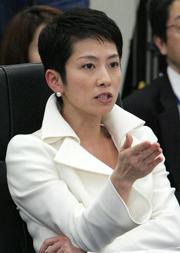It is relieving to know that vigilant Japanese groups are watching over the administrative spending of research institutions in Japan. According to the news article below--which was released by the high-ranking scientific journal, Nature--the 12-digit annual budget for research will be reduced due to exessive spending by concerned institutions such as RIKEN and Japan Science and Technology Agency.
While the macroscopic scenario is being scrutinized, I hope that the microscopic environment of research in Japan will be evaluated, too. There had been reports in the recent past related to this issue. Such issue is fully illustrated in the book JAPAN Lights and Shadows.
Japan's research institutions in the hot seat
Government oversight committee urges scientists to make savings.
In four days of hearings that began on 23 April, some of Japan's most prominent research institutions and funding agencies came under fire from government-appointed budget watchdogs. But the harsh words and suggested cuts were aimed mostly at administrative operations.
This is the second round of scrutiny of government-funded organizations by the cabinet's Government Revitalization Unit (GRU), established by the incoming government last autumn. The remit of the GRU working groups, composed of lay professionals and politicians, is to pick through government budgets and ask questions of those responsible for spending the money. The hearings, which can be viewed live online, have proved popular.
 Tough-talking Renho has become the figurehead of the working groups that are out to trim budgets. Sankei/ Getty Images Tough-talking Renho has become the figurehead of the working groups that are out to trim budgets. Sankei/ Getty Images |
In the first round of hearings last November, the major cuts recommended at facilities such as the SPring-8 synchrotron in Harima and a planned supercomputer caused a storm of protest among researchers, but the budgets that incorporated the recommendations, which went into effect on 1 April, reflected only modest decreases. Nonetheless, scientists and science administrators working at the 'Independent Administrative Institutions' — which are being scrutinized in the second round of hearings, and which include the seven-campus natural sciences institute RIKEN and the Japan Science and Technology Agency (JST) headquartered in Saitama — began to feel the heat.
The audits started last Friday, with geneticist Sydney Brenner stroking his beard as he sat opposite Renho, the parliamentary representative of the ruling Democratic Party of Japan, who is known by her first name only. With her sharp haircut and pointed comments, she has become the symbol of the working groups.
Through an interpreter, Brenner described his vision for the Okinawa Institute of Science and Technology (OIST), of which he is president. He spoke only a few sentences before being cut off. Renho said: "We all agree that science and technology is a fantastic thing. But we are here to discuss whether taxpayer's money is being wisely spent, for example, with regard to your board of governors."
The OIST's board of governors is composed of ten scientists, including five Nobel laureates. They receive an annual US$10,000 honorarium: $5,000 for each of the biannual meetings they attend (to which they fly first class). Overall, the OIST spends between ¥30 million to ¥36 million (US$320,000–$384,000) per year to get feedback from these luminaries. The working groups called for a reduction in the costs and a "strengthening of governance".
Following the hearing, Brenner said: "The level of honorarium is appropriate and it enables us to consult, ask questions and seek support by contacting them at any time during the year." He agreed to make efforts to reduce the costs of the board meetings.
“We are here to discuss whether taxpayer's money is being wisely spent.”
Inspection of expenses at other organizations — such as RIKEN and the Japan Society for the Promotion of Science (JSPS) in Tokyo — also focused on administrative costs and issues of governance. RIKEN was criticized for hiring spouses of researchers as secretaries, and for contracting construction and other outlays through internal connections rather than through open bidding. Both JSPS and RIKEN say that they will make changes corresponding to working-group recommendations.
Such recommendations are not legally binding, but they are submitted to the head of the GRU, Naoto Kan, who is also the government's finance minister. Failure to comply would probably affect the success of the next budget request.
Koichi Kitazawa, president of the JST, is taking no chances. Ahead of the hearings, Kitazawa carried out his own audit, cut back on administrative costs such as company cars (including his own) and shut down some offices. He trimmed ¥2 billion from the JST's ¥111-billion budget. "I was thinking we needed to do this anyway," he says. "This hearing was an excellent chance." Following working-group recommendations, Kitazawa plans to trim another ¥2 billion this year.
The working groups made no call for a budget decrease for the JST, which supplies the country's most generous annual grants. Kitazawa says that the ¥4 billion he saves will be shifted to grants. "For the young researcher programme, that's enough for 400 people," he says.
Japan's researchers will have to get used to the scrutiny as there will be another round of hearings looking at different institutions next month. After that, the cabinet will entrust the audits to the working groups within each ministry that are currently being established. According to a representative of the GRU, the current widely publicized audits are meant "as a model" for the transparency that bureaucrats are expected to show in the future.
Originally posted here
No comments:
Post a Comment